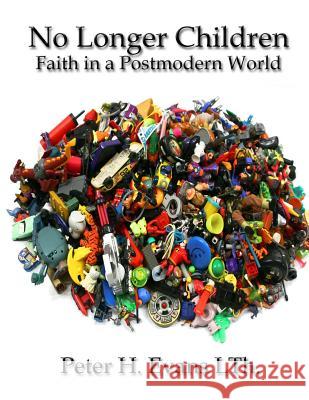No Longer Children: Faith in a Postmodern World » książka
No Longer Children: Faith in a Postmodern World
ISBN-13: 9781514240861 / Angielski / Miękka / 2015 / 144 str.
An exploration of the meaning of faith and the place of religion in the world of the 21st Century by Peter H. Evans Is the rise of fundamentalisms, both religious and secular, an indicator of the future for faith and religion in the 21st century, or is it the last gasp of a dying culture leaving no future place for religious belief and the faith and practice it engenders? Writing out of thirty five years serving as a professional minister of religion and a lifetime as an active participant in the life of the Christian church, Peter Evans would say no to both propositions. "No Longer Children" is an exploration of the reality that many of the terms and concepts of traditional religion no longer resonate with men and women in our modern scientific and materialist culture. Terms like "Heaven" and "Hell" have long since lost their immediate power and the more recent expansion of psychology and neuroscience are forcing a similar revision of terms like "Soul" and "Spirit." Thus rendering notions of a purely private and personal salvation overly self interested and even unnecessary. These terms and concepts no longer make contact with either the hopes or the fears we share. While religion has brought, and continues to bring, many social and community benefits, it has also given rise to many gross abuses of power. Any return to fundamentalism and orthodoxy only increases the latter. Peter Evans argues that the true role for religion is that of reminding us of what may be of value: as a signpost rather than a destination. It can never be the repository of ultimate truth. It is an exploratory path rather than a predetermined road. It is a journey to be undertaken, not because of our fears, but in spite of them. "All our theologies," he argues, "are the garments we fashion to clothe that to which we give the name 'God'. Like any garment they are formed from the materials available at the time and according to the fashions of the day, and the quality of the end product is ultimately dependant on the skill of the tailor." This does not mean that all such formulations are without value or that one may summarily dismiss one's own or another's religious or spiritual experience. It is a call for true religious liberty and spiritual responsibility. "No Longer Children" is intended for the general reader. While he predominantly approaches these issues from the tradition he knows best, he believes that what is true for Christian belief applies equally to other faiths and religious traditions.











